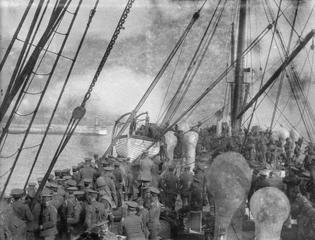A secret German deal with Ottoman Turkey
British troops head for France; the war at sea
Special to The Great War Project
(9-11 August) The first troops of the British Expeditionary Force leave Britain by ship for France on 9 August a century ago. The German navy makes no attempt to stop them.
The war at sea does claim its first victims. At dawn on 9 August, the British warship Birmingham rams and sinks the German submarine, U-15 – the first such submarine loss of the war.
A few days before this, the British warship Amphion hits a mine in the North Sea and sinks, drowning 150 men, among them German sailors captured while laying the mines.
And in far-off Central Africa, a British gunboat sails across Lake Nyasa and seizes a German warship there. According to one historian, the German captain is not aware that Germany and Britain are at war. A British newspaper proclaims: “Naval Victory on Lake Nyasa.”
Germany is working hard in secret to bring Islamic Ottoman Turkey into the war on its side. On 2 August Berlin signs a secret treaty with Turkey, and that gives rise to much secret plotting against Germany’s enemies in the Middle East.
Writes one historian, “Germany’s leaders saw in Islam the secret weapon which would decide the world war.”
Enver Pasha, the Ottoman minister of war, has already sent out secret feelers to plot jihad in Afghanistan, the Caucasus, Baghdad, Benghazi, and Cairo. Already plans are afoot for an Ottoman attack on the Suez Canal. The goal? To bring down the British in the Middle East and India.
Russia’s presence in Central and Western Asia is also a target of German designs. Germany sends feelers to Persian officials. “The objective,” historians report, “was to promote an Islamic insurgency targeting Russia from northern Persia and Afghanistan.”
Some in Germany are also considering how the Jews in Russia can aid in the German war effort. Prominent figures in Berlin proposed that “Germany combine the Kaiser’s anti-British jihad with an Israelite-cum-Zionist rebellion in Russia.”
Russian Jews “would then lead the way in toppling the Russian Tsar.”
The rhetoric of the war quickly turns racist. On this day a century ago, at a public meeting in Berlin notes historian Martin Gilbert, the director of the Royal Library has scathing words for the Russian enemy, calling it the Mongolian Muscovite Horde, an “unorganized Asiatic mass.”

